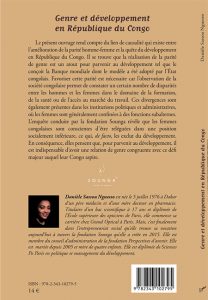Soul devourers

Born in 1978 in Burkina Faso, Nyaba L. OUEDRAOGO has been awarded several international prizes. He adopts an approach focusing as much on documentary as on anthropology. Nyaba first reflected on contemporary issues (such as wastes with L’enfer du cuivre, 2008, or the mutation of African societies through Erreur humaine, 2011). Then, he embraces a photographic poesy, in particular with his series The Phantoms of the Congo River. In 2014, he produces The Soul Devourers a diptych photograph series that depicts the ambiguity of representation, particularly of women accused of sorcery.
Signature of Daniele SASSOU NGUESSO’s book
Presentation of the book
To get the book : http://tinyurl.com/h6ljnjz
Auteur : Danièle Sassou Nguesso
Préface : Michel Courcelles
Editeur : L’harmattan
Date de parution : 05/10/2016
Collection : Harmattan Congo
EAN : 978-2343102795
ISBN : 2343102791
The covers of the book
 |
 |
